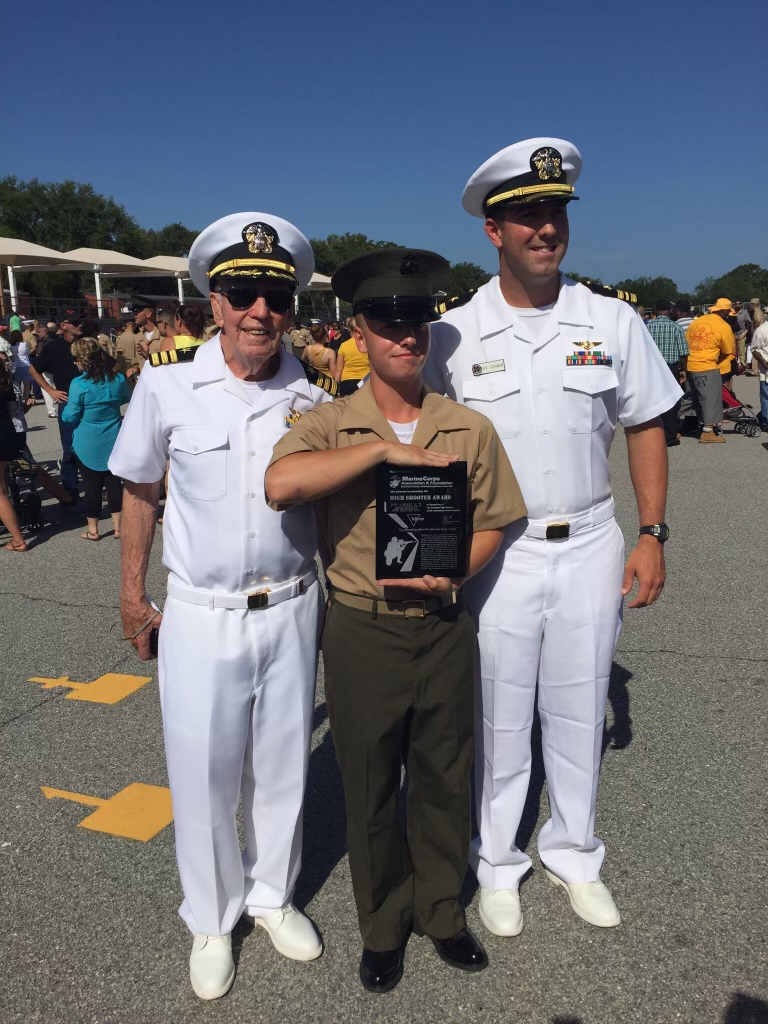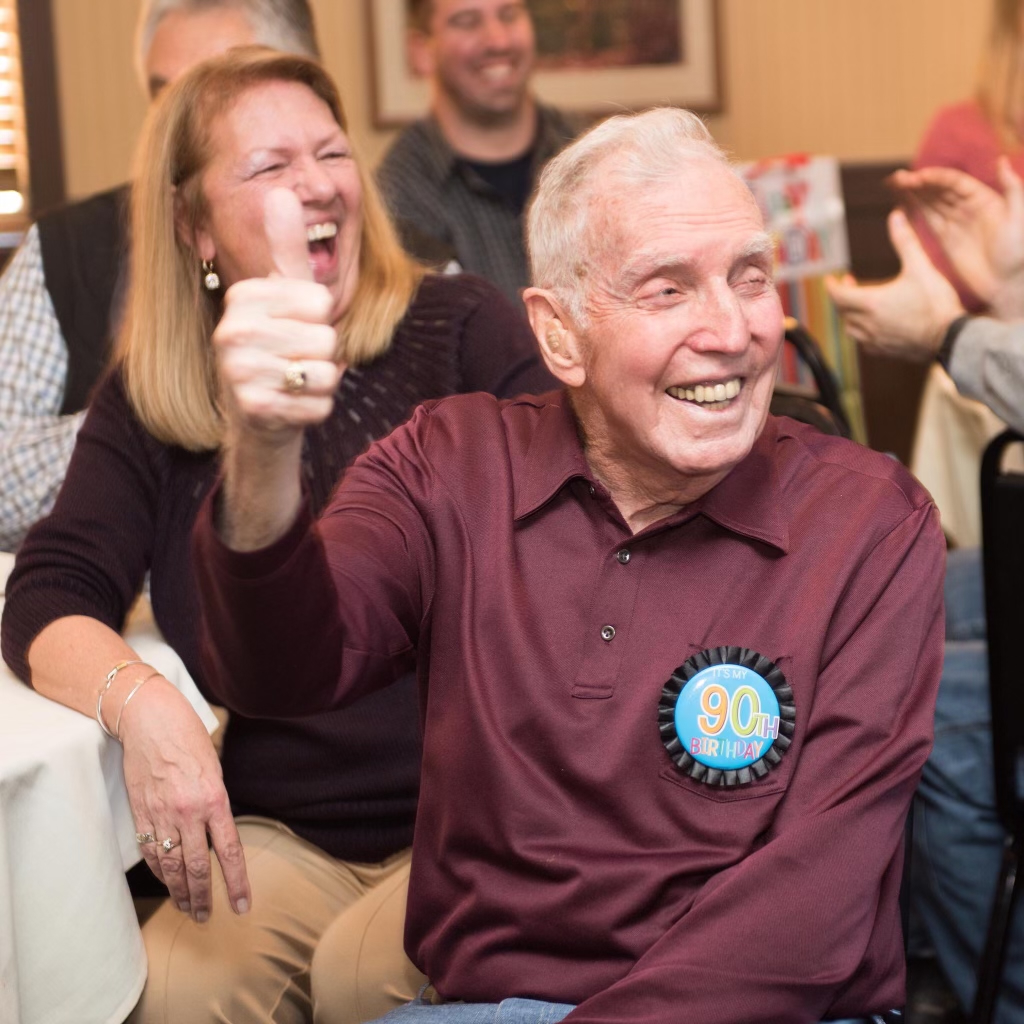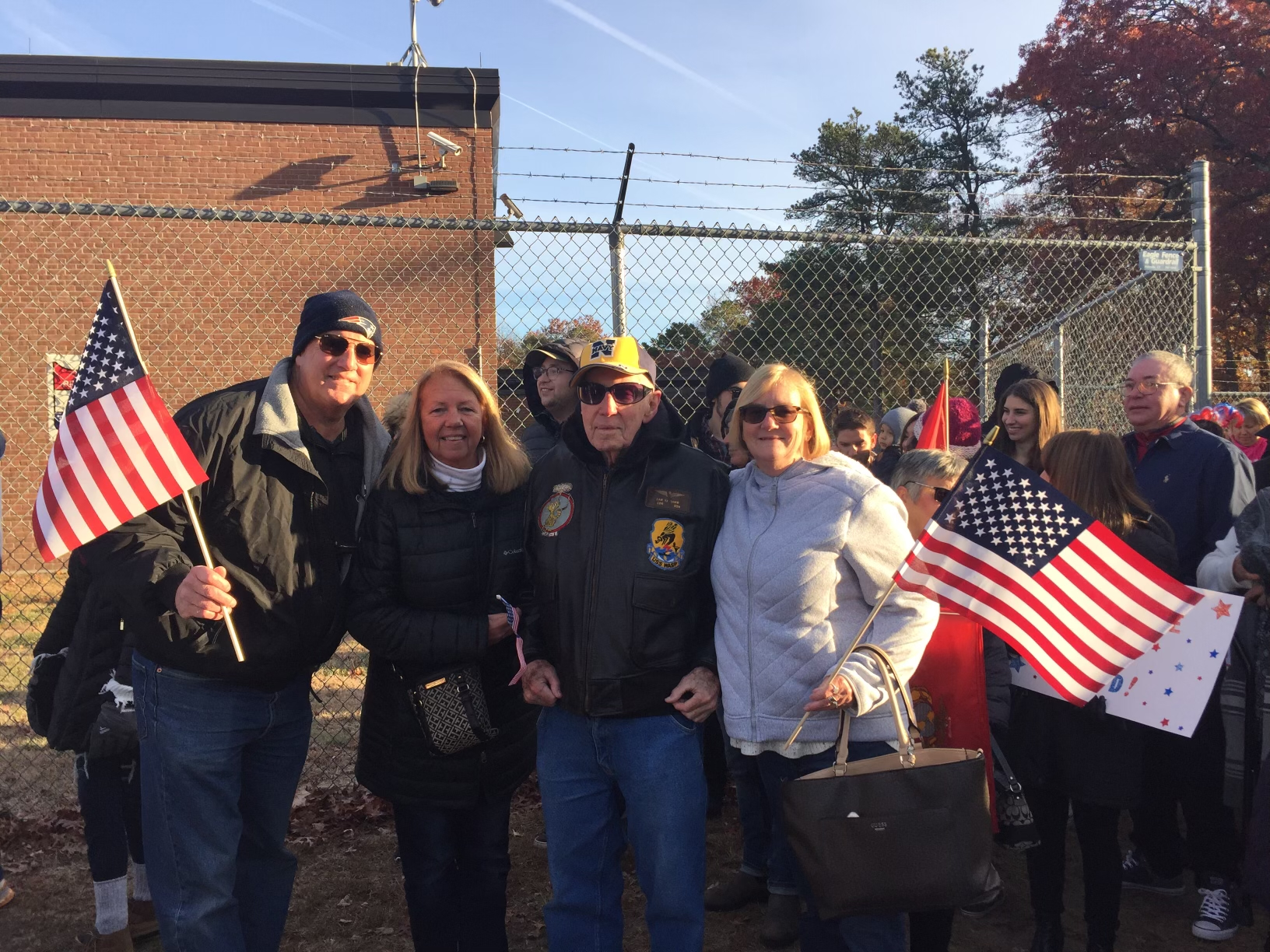Commander Daniel Kershaw lived 97 remarkable years — a lifetime defined by faith, family and service.
“He never spoke badly about anyone. He gave to every charity that asked. He was so humble, with this quiet wit and twinkle,” says his eldest daughter, Kathy.
“He was just a really special guy,” says younger daughter Beth. “They don’t make them like that anymore.”
And his life of service was an inspiration in more ways than one. Kathy’s son, Eric, followed closely in his grandfather’s footsteps: attending Maine Maritime Academy, earning pilot’s wings like his grandfather and himself rising to the rank of commander. (Commander Kershaw swore him in.) Beth’s son, Steven, joined the Marines and served in Afghanistan. When he returned home, his grandfather was there to greet him at the airport, dressed in his military flight jacket.
“He was so darn proud of our kids — of seeing another generation serve,” says Beth.
And when his own lifetime of service was drawing to a close, Commander Kershaw’s family and hospice team arranged one final military ceremony to send him off.
> Learn how to get started with hospice care.
“Hospice doesn’t mean giving up”
All his life, Commander Kershaw was active and fiercely independent, walking every day, rain, shine or snow. To celebrate turning 80 years old, he jumped out of a plane with his daughters.
After a fall at age 97, though, his health began a steep decline. The injury left him not just bedridden, but in agony. He needed an extra layer of care.
His three children — Kathy, Beth and son Daniel — knew that it was time to at least consider hospice. At the same time, they wanted to be sure their father would still have every chance to recover.
“Dad had bounced back many times before. We didn’t want to take that opportunity away from him. But we’d also promised him that we would never let him suffer — and he was suffering,” says Kathy.
The family reached out to HopeHealth, where intake coordinator Kirsten helped guide them through those first difficult decisions. Kirsten explained what hospice would add to their father’s care: special medical care for pain management and comfort, additional emotional and spiritual support for the whole family. She explained what it would continue to protect: the family’s control over his medical decisions, including the ability to stop hospice at any point. That was the piece of information they’d needed most.
“When you hear the word hospice, you think finality. But for anyone else who finds themselves at that crossroads, I think the biggest takeaway is that if people get better, they can come off hospice,” says Kathy.
“Hospice doesn’t mean giving up,” Beth adds. “It’s about keeping people comfortable and doing whatever you can to eliminate pain.”
When the HopeHealth hospice team entered the picture, that’s what they did. As retired nurses, Kathy and Beth were especially attuned to their dad’s hospice nurse, Sarah.
“Sarah was wonderful,” Beth says. “She listened, she respected us as both family and medical professionals, and she was right there whenever we needed something.”
Until his final days, Commander Kershaw remained alert and surrounded by loved ones until his final days. “He never stopped knowing us, which was the greatest gift we could ask for,” says Beth.

“We do a special ceremony for veterans”
In the last week of Commander Kershaw’s life, Beth slept on the pull-out couch in his room at his facility. Most days, she stepped out first thing in the morning for a quick coffee run. One day, for reasons she couldn’t quite pin down, she decided to skip it. And so, by luck, she was there HopeHealth hospice social worker Keith Townsend tapped on the door. He sat with Beth for awhile, talking about her father’s life and military service. He mentioned a hospice volunteer service known as a pinning ceremony.
“Keith said, ‘We do a special ceremony for veterans — would you be interested?’” Beth recalls. “I said absolutely.”
By then, they knew that Commander Kershaw might be in his final hours. So Keith found a way to set the ceremony up for two o’clock that afternoon. When he learned that grandson Eric had flown in the night before and would be joining too, he requested a second pin for Eric.
For the ceremony, Commander Kershaw was surrounded by his children, their spouses and Eric. As the ceremony began, Eric knelt beside his grandfather and gently touched his arm. In Navy tradition, when coming aboard a ship, an officer asks permission to board. “Grandpa, commander,” Eric whispered, “permission to go to heaven.”
“Two seconds later, Dad took his last breath,” Kathy says. “Because of the pinning ceremony, we were all there beside him. It was beautiful.”
“He had a wonderful life. He was at peace at that point,” says Beth. “He went to heaven with all of us right there.”
> Read: “Dear Veteran”: A letter-writing campaign reaches veterans at the end of life
“He would’ve wanted that”
The next week at the cemetery, after taps had played and the flag presentation had concluded, Commander Kershaw’s grandsons lingered for an extra moment at his gravesite.
Decades earlier, when Eric earned his pilot’s wings, Commander Kershaw had presented him with his own. Eric had worn that pin, engraved with both their names, his entire career. Now, with his cousin Steven at his side, both men in military uniform, he removed the pin and banged it into the coffin.
“I’m returning your wings, grandpa,” Eric said. He and Steven saluted their grandfather one last time.
It was a final honor for a man who embodied the word.
For Kathy and Beth, honor was what their father had offered to others throughout his life, and everything he deserved in return. In his final days, it was something he also found in the care he received through hospice. Now, they hope other families know how find that same respect and dignity when they need it most.
“People think hospice means death,” Kathy says. “It doesn’t. It means comfort. It means honoring life right to the end.”
“Dad did not suffer. HopeHealth made sure of that,” says Beth. “Now, if his story can help anyone else, he would’ve wanted that.”


